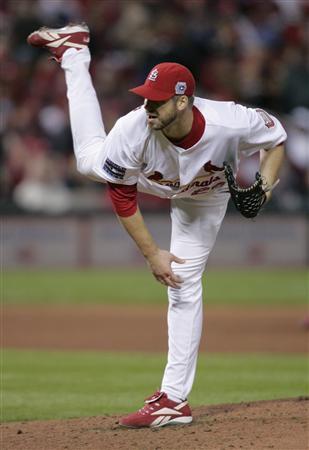|
|
|
Amigos w/ Common Interests
|
|
|
|
|
|
|
|
|
|
|
|
|
|
|
|
|
|
<<
View Prev Image
|
|
|
|
View Next Image >>
|

|
|
|
Normally I never bet on an NL team. But this is LaRussa's team, with Dave Duncan as pitching coach.
Ed has the Tigers. We shall see . . .
above REUTERS PHOTO: St. Louis Cardinals starting pitcher Chris Carpenter throws in the fifth inning against Detroit Tigers during Game 3 in Major League Baseball's World Series in St Louis, October 24, 2006.
Duncan Making Trust His Best Pitch as Coach
Science of Pitching Comes Naturally to Former Catcher
By TYLER KEPNER
The New York Times
ST. LOUIS -- On most critical issues for the St. Louis Cardinals, Manager Tony La Russa seeks the input of his trusted pitching coach, Dave Duncan. They were minor league teammates as far back as 1965 and have worked together since 1983.
Yet in spring training, when it was time to discuss the makeup of this year’s roster, Duncan excused himself. His son Chris was under consideration.
“I didn’t want their comments to be altered because I was sitting in the room,” Duncan said. “I wanted them to voice their true opinions.”
The younger Duncan started the season at Class AAA Memphis, but was promoted to the Cardinals in May. He started the first game of the World Series, but not as a pitcher.
Chris Duncan is an outfielder who hit 22 home runs this season and has not pitched since high school. His father was a catcher who never pitched at any level. Chris’s brother, Shelly, is a power-hitting prospect for the Yankees.
Pitching is the profession for Duncan, but it is not in the pedigree.
“As a pitcher, you’ve got to be born with a good arm,” Chris Duncan said. “Mine seemed to always hurt. My velocity wasn’t that good, and my command wasn’t good. I didn’t have what it took to be a pitcher.”
Dave Duncan caught for parts of 10 seasons with the A’s, the Indians and the Orioles. He had enough power to hit 109 homers, but his average was just .214. He started his next career as a bullpen coach and said pitching coach was the natural next step.
But actually getting on a mound and pitching? That was never something he tried. “Probably a lot of people thought I should have,” Duncan said, “with the way I hit.”
From his playing experience, Duncan knows how it feels to try to hit home runs. He knows how pitchers can exploit that, and he saw the Cardinals’ Anthony Reyes do it to the Tigers in a surprise victory in Game 1.
The Tigers hit several pop-ups that night, Duncan said, probably a sign that they were swinging for the fences. Reyes preyed on that aggressiveness and lasted eight innings for the victory.
Jeff Weaver, who thrived under Duncan after a miserable three months this season with the Los Angeles Angels, lost Game 2 of the World Series but kept the Cardinals in it, allowing three runs in five innings. Chris Carpenter allowed only three hits in eight innings for a 5-0 victory Tuesday night in Game 3. Jeff Suppan will pitch Game 4.
In 2005, Carpenter became the fourth Cy Young award winner under Duncan, joining LaMarr Hoyt, Bob Welch and Dennis Eckersley. As a player, Duncan caught three Cy Young winners -- Vida Blue, Catfish Hunter and Jim Palmer.
“He has so much knowledge,” Carpenter said. “He gives you so many weapons. He’s able to prepare you so well with all of his charts and things that he keeps.”
La Russa praised the 61-year-old Duncan for constantly seeking better ways to prepare. Before computer or video analysis was the norm, La Russa said, Duncan was already doing it.
“He’s always been hungry to stay ahead of it,” La Russa said. “I say that because I still do stuff longhand. I’m just old-fashioned that way. But I’ve always been impressed, because he’s always searching.”
Carpenter arrived in St. Louis in 2003 with a surgically repaired labrum and a 49-50 career record. He needed a year to recover from the injury. Since then, he is 51-18. Carpenter said he absorbed Duncan’s lessons in his year off.
“I was able to sit around and listen and watch,” Carpenter said. “When I was a young kid, I didn’t think about up and down and things like that. I was just trying to throw the ball away, trying to throw the ball in, I wasn’t thinking about throwing my curveball for strikes.
“But when I came here, he talks about throwing the ball down in the strike zone and getting ahead and attacking the strike zone. All these things have helped me progress and be successful, and I owe him a lot for what I’ve done the last few years.”
Duncan was vague about what advantages he gets from having been a catcher. Working with different styles of pitchers -- and a lot of very good ones -- taught him well, he said. Gary Bennett, the Cardinals’ backup catcher, said Duncan’s background makes a difference.
CONTINUED BELOW |
|
|
|
|
|
| |
|
|
|
|
|